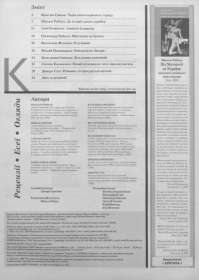Me and the Other In Krytyka, No. 5 (31), 2000, pp. 20-22.
Keywords:
Emmanuel Levinas, ethics, phenomenologySynopsis
The article examines the philosophical work of Emmanuel Levinas. The text consists of an introduction and seven parts: 1) Writing style; 2) Levinas and German phenomenology; 3) The idea of totality and infinity; 4) Levinas and Judaism; 5) Sartre and Levinas; 6) Levinas and Ricœur; 7) The concept of history.
In the introduction, the author emphasizes the need for a non-vulgarized, source-based reception of Levinas' philosophical due to the publication of the Ukrainian translation of his collection of articles “Between Us. Research on Thought-about-the-Other”.
The first part of the article focuses on metaphor as a tool for searching for an open, non-mysterious logos, the ideal of which Levinas sees in the Greek language.
The second part examines the philosopher's relationship with the phenomenological tradition: from the influence of the phenomenological project of approaching things directly to the concept of the Other, in which Levinas departs from traditional phenomenology. The author emphasizes the responsibility in which the relationship with the Other exists in Levinas' ethics.
The third part of the article describes how Levinas rebels against the Western philosophy's tendency toward totality, the pinnacle of which is Hegel's dialectic.
The fourth part discusses the influence of Judaism on the philosopher, in particular the unique combination of Jewish and Greek influences in his ethics.
The fifth part focuses on the contrast between the biographies and philosophical ideas of Sartre and Levinas.
The sixth part examines Levinas' philosophical dialogue with Paul Ricœur. The author sees the main difference between the views of the two thinkers in their attitude to death and the specifics of interpreting the connection between the Self and the Other.
The seventh part examines Levinas' rejection of a linear view of history, which led to his condemnation of revolutions and totalitarianism.
Downloads




